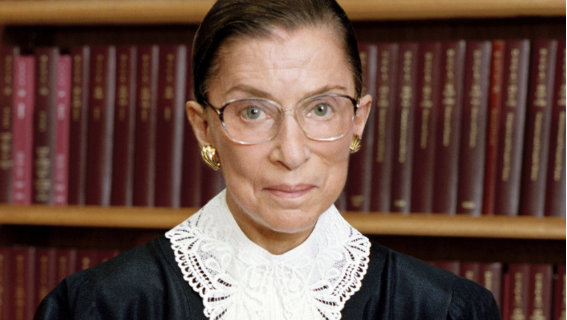With Justice Ruth Bader Ginsburg having departed this life, passing, as it were, from judging to Judgment, it is reassuring that the overwhelming majority of conservatives are not stooping to the ugliness that we saw from the Left when Justice Scalia died, and are rather respectfully, if not begrudgingly, acknowledging Ginsburg’s many years on the bench and thinking of her family. Rarely do people of character regret being gracious, demonstrating class, and showing oneself to be the better person, and indeed, this should be among our distinguishing characteristics as conservatives.
But just as I’m not going to celebrate her death, I’m also not going to celebrate Ginsburg’s life, and join in this rather bizarre elevation of her to sainthood across the political and social spectrum. Few jurists have been more wrong, more often, and more loudly, than Ginsburg, and with more horrible, real-world consequences. And worse, this cannot be written off as simply a failure of judgment, when it’s quite clearly a failure of values.
Sixty million American babies have now been killed by abortions since Roe v. Wade, which she enthusiastically protected for nearly three decades. Name one person who is responsible for more innocent deaths than her. And, no, she cannot escape this legacy, because there was nothing to compel her complicity. Her hands weren’t tied. If anything, she was tying the hands of the states and inferior courts whenever they attempted to at least reduce the carnage.
And she would not ask to escape this legacy, either. This was the most important issue during her life — not just to pro-lifers, but to her as well — and she made it her cause celebre. She has to own it because she asked to own it, and “it” is the greatest human rights violation of the last century, and she was clearly on the wrong side. Worse, she cannot be dismissed as being merely “wrong on the issue,” as though innocently mistaken, because to be “wrong” is either an intellectual or a moral failure. Not that either is especially flattering, but someone so universally acclaimed for her intelligence cannot be afforded the benefit of ignorance (as though there can be any doubt about what abortion is), especially when her actions were so deliberate.
So if this was not an intellectual failing, it could only have been a moral one. To be clear, Ginsburg was not simply wrong on abortion as a constitutional principle, she was willfully wrong because she thought she was morally right. One cannot defend abortion as a constitutional right without defending it first as a moral one, because the Constitution does not offer it any legal support. It can therefore only exist as a constitutional right in the minds of those who support it as a natural right.
That is her legacy, that she was immoral on the most consequential moral question of our time. Ginsburg is the undisputed face of abortion, this generation’s Margaret Sanger, only far more intelligent, and therefore more culpable.
The best thing that could be said about Ginsburg as a judge is that on most other divisive issues, she did not have the support of enough of her colleagues to make a difference, and will therefore be remembered more for her vainglorious dissents than the precedent she helped to create. At worst, she was a terrible judge who should go down in history as an example of everything a judge should not be: a result-oriented sophist oriented to the wrong result, and proudly on the wrong side of humanity, if not history.
Other thoughts:
- Democrats are now threatening to resume rioting (did it stop?) if they don’t get their way on the Supreme Court. Odd that the same people who constantly tell us that conservative speech is “dangerous” and “violent” are very quick to threaten actual danger and violence.
- The same group of people who say Republicans run elections based on fear, and playing to our basest instincts, are sure doing a good job of spreading a lot of fear in the wake of RBG’s demise. Here’s a promise: no matter who our next justice is, the Supreme Court will not “undo gay marriage,” and invalidate all these marriages. It will not force anyone to a “back-alley abortion.” It will, at most, restore some modicum of state sovereignty on the abortion issue, and totally disregard the gay marriage question. The Court can only rule on laws being challenged, and Republican legislators throughout the land are uniformly glad to be done making laws relating to gay marriage, grateful as they are to the Court, and Justice Ginsburg, for removing such a divisive, and ultimately losing campaign issue.
- Several reports indicate that Ginsburg’s dying wish was that her replacement not be named until a new president takes office. That’s nice. If her replacement was so important to her, she could’ve resigned during the early years of the Obama presidency, as two of her colleagues did (and then as Justice Anthony Kennedy did during the Trump presidency). So the jurist the Left is today canonizing is actually the architect of their self-perceived problem.
- That one person’s death (who, by the way, had well-exceeded the average American’s life expectancy) can cause so much existential angst for half the country is yet another reason why we should reconsider not only how jurists are appointed to the Supreme Court and for what duration, but perhaps also the role of the Court in American life. We should all be able to agree that one person should not have such a substantial impact on the lives of 330 million people, especially one who was not even elected.
- Democrats love to talk about honoring Ruth Bader Ginsburg’s legacy. Ginsburg was confirmed by a vote of 96-3. Let’s see if the Democrats honor that legacy.
- The new, and disappointingly predictable thing from the Left is to talk about how having four conservatives, four liberals, and one swing vote on the Supreme Court is good for the country, creating as it does some semblance of equanimity, and to bemoan that the balance is likely to tip now to a solid conservative voting bloc… as though the Left wouldn’t pack the Court with nine liberals if given the chance. Everyone relax. Liberals will live through this, just as everyone else lived through the Warren Court. Well, except the 60 million people absent from our population today because they were killed by abortions.
- And speaking of packing the Court, the Democrats, who reflexively scream about some vague “threat to democracy” whenever elected Republicans do what they were elected to do (which sounds a lot like democracy), are now openly talking about packing the Court by adding new seats to it once they get control of the government, proving once again that they are much better strategists than Republicans, who, if they were serious about overturning Roe and other constitutional abominations, would have done this long ago. But Democrats have a natural advantage when it comes to this sort of strategizing: conservatives concern ourselves with conserving things we think are good, like America and its institutions, so we protect them. Liberals, who, by definition, are forever inclined toward change and remaking the world in their own image, have no such compunction.
- That liberals are today able to credibly use Mitch McConnell’s own words against him from the Merrick Garland nomination — arguing as he did that we shouldn’t hold hearings on a nominee with an election so close — demonstrates why one should never govern by pretext. The argument against Garland should always have been that the Supreme Court is important, that Republicans will always do their best to block court appointees who are ideologically opposite them, and advance the nominations of those ideologically consonant with them, just as Democrats do, because that’s what they’re both elected to do. The end. Pretext can always be turned against you. The great thing about telling the truth is that it’s very easy to be consistent.
- And by the way, what was even the value of the pretext? Usually dishonesty serves a purpose. What was the purpose of McConnell hiding (not convincingly, by the way) that he didn’t want to vote on Garland because he’s a liberal?
- But, in the end, talking points aren’t law. And the Democrats took the opposite position during the Merrick Garland nomination than they’re taking today. So, deal with it.
- I’ve been hearing all these stories about how Ruth Bader Ginsburg and Antonin Scalia were great friends despite their ideological differences. Yeah, that’s easy, when you’re elevated high above the rest of the world, and are thereby insulated from the effects of the other person’s decisions, so your disagreements are merely academic, and of no more consequence to each other than favoring different sports teams. The problem is that the rest of us have to live with the decisions that the other side make when they get into power, they have real-world effect on us, so we don’t have the luxury of disregarding their different ideas, intentions, and actions, as triviality.
- Quote of the day: “That’s their job,” Ginsburg said, when asked whether the Senate should give the 63-year-old judge Merrick Garland a fair hearing. “There’s nothing in the Constitution that says the President stops being President in his last year.”
- Being nominated by the President of the United States to a seat on the Supreme Court should be a universally acclaimed reward for an exemplary legal career. Instead, whoever is selected in a few days will be rewarded by immediately becoming the most hated person on the planet. Say what you want about “both sides do it,” but it’s just not true. Nobody ever put a Democrat Supreme Court nominee through what Republicans routinely experience, and certainly not anything like this poor person is about to experience.
- The video below demonstrates how I feel whenever I hear Democrats emerge from their safe spaces to make a threat about what will happen if Republicans don’t act the way they want. Just replace “Germans” with “Democrats.”




